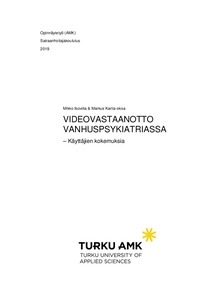Videovastaanotto vanhuspsykiatriassa : käyttäjien kokemuksia
Isoviita, Mikko; Kanta-oksa, Markus (2019)
Isoviita, Mikko
Kanta-oksa, Markus
2019
All rights reserved. This publication is copyrighted. You may download, display and print it for Your own personal use. Commercial use is prohibited.
Julkaisun pysyvä osoite on
https://urn.fi/URN:NBN:fi:amk-2019053113682
https://urn.fi/URN:NBN:fi:amk-2019053113682
Tiivistelmä
Varsinais-Suomen sairaanhoitopiiri (VSSHP) otti vuonna 2019 suuren harppauksen digitalisaation etenemisessä, kun VSSHP:n psykiatrian potilaille tuotiin mahdollisuus valita itselle etävastaanotto, jos lääketieteellisiä esteitä tälle ei löydy. Sairaanhoitopiirin alaisuudessa toimiva vanhuspsykiatrian tehostettu avohoito otti etävastaanoton käyttöön pilottina jo vuoden 2018 aikana, tarkoituksenaan laajentaa etävastaanoton käyttöä seuraavina vuosina.
Tämän opinnäytetyön tarkoituksena oli kartoittaa vanhuspsykiatrian tehostetun avohoidon potilaiden kokemuksia etävastaanotosta. Tavoitteena on tuottaa tietoa, jota voidaan tulevaisuudessa hyödyntää vanhuspsykiatrian etävastaanottotilanteissa. Tutkimusongelmat olivat: 1. Millaisia odotuksia vanhuspsykiatrian tehostetun avohoidon potilailla oli etävastaan otosta? 2. Millaisia kokemuksia vanhuspsykiatrian tehostetun avohoidon potilailla on etävastaan-otosta? 3. Miten vanhuspsykiatrian tehostetun avohoidon potilaat kehittäisivät etävastaanottoa tulevaisuudessa? Opinnäytetyön tutkimusosuus toteutettiin teemahaastatteluna ja aineisto analysoitiin induktiivisella sisällönanalyysillä.
Potilailla oli sekä positiivisia, että negatiivisia odotuksia etävastaanotosta. Negatiiviset odotukset liittyivät lähinnä pelkoihin laitteen vaikeasta käytettävyydestä tai kalliin laitteen rikkoutumisesta. Positiivisia odotukset olivat, kun laitteesta oli annettu tarpeeksi tietoa etukäteen ja laite tiedettiin helppokäyttöiseksi. Kokemukset etävastaanotosta olivat valtaosin positiivisia. Etävastaanottoon käytettyä laitetta kehuttiin helppokäyttöiseksi ja etäyhteydellä käytyjä keskusteluja hyödyllisiksi. Keskustelua pidettiin pääosin luontevana ja videoyhteyttä pidettiin puhelua parempana tapana pitää yhteyttä hoitohenkilökuntaan. Kehitysehdotukset rajoittuivat ainoastaan toiveisiin saada tekniikka toimimaan hieman nykyistä luotettavammin.
Aikaisempi tutkimustieto aiheesta tukee tässä opinnäytetyössä saatuja tuloksia. Etävastaanotolla on paljon potentiaalia, jatkossa vastaaviin tutkimuksiin olisi hyvä saada mukaan myös hoitohenkilökunnan näkemyksiä. Turku University Hospital (VSSHP) took another step towards digital health care services in 2019, when it brought it’s patients a chance to choose video counselling over face-to-face meetings, if no medical obstacles exist for the patient. VSSHP:s intensive elderly psychiatric outpatient care started using video counselling as a pilot in 2018, with a goal to broaden the use in the coming years.
The purpose of this thesis was to collect user experiences from the patients that were using or had been using video counselling as a part of their care. The objective of the thesis is to gain information that could be used in future video counselling situations. The research questions were: 1. What kind of expectations did the patients in intensive elderly psychiatric care have for the video counselling? 2. What kind of experiences did the patients in intensive elderly psychiatric care have with the video counselling? 3. What kind of suggestions did the patients have to develop video counselling in the future? The study was conducted using a semi-structured interview. content analysis and inductive reasoning were used as the methods for the analysis.
According to the results of this study, patients had both negative and positive expectations about video counselling. Negative expectations were mostly fears about the tablet computer being too difficult to use or fears that the machine might break down. Expectations were positive, when the patients were given enough information beforehand, and patients knew the machine was easy to use. Experiences were mostly positive. The tablet computer was easy to use and the discussions were useful to the patients. The discussions felt natural for the most part and video counselling was unanimously preferred over a traditional phone call. Development ideas were limited to improving the technology.
Previous studies on the subject support the results of this thesis. Video counselling has a lot of potential, in the future studies it might be useful to examine nursing staff’s opinion on the subject.
Tämän opinnäytetyön tarkoituksena oli kartoittaa vanhuspsykiatrian tehostetun avohoidon potilaiden kokemuksia etävastaanotosta. Tavoitteena on tuottaa tietoa, jota voidaan tulevaisuudessa hyödyntää vanhuspsykiatrian etävastaanottotilanteissa. Tutkimusongelmat olivat: 1. Millaisia odotuksia vanhuspsykiatrian tehostetun avohoidon potilailla oli etävastaan otosta? 2. Millaisia kokemuksia vanhuspsykiatrian tehostetun avohoidon potilailla on etävastaan-otosta? 3. Miten vanhuspsykiatrian tehostetun avohoidon potilaat kehittäisivät etävastaanottoa tulevaisuudessa? Opinnäytetyön tutkimusosuus toteutettiin teemahaastatteluna ja aineisto analysoitiin induktiivisella sisällönanalyysillä.
Potilailla oli sekä positiivisia, että negatiivisia odotuksia etävastaanotosta. Negatiiviset odotukset liittyivät lähinnä pelkoihin laitteen vaikeasta käytettävyydestä tai kalliin laitteen rikkoutumisesta. Positiivisia odotukset olivat, kun laitteesta oli annettu tarpeeksi tietoa etukäteen ja laite tiedettiin helppokäyttöiseksi. Kokemukset etävastaanotosta olivat valtaosin positiivisia. Etävastaanottoon käytettyä laitetta kehuttiin helppokäyttöiseksi ja etäyhteydellä käytyjä keskusteluja hyödyllisiksi. Keskustelua pidettiin pääosin luontevana ja videoyhteyttä pidettiin puhelua parempana tapana pitää yhteyttä hoitohenkilökuntaan. Kehitysehdotukset rajoittuivat ainoastaan toiveisiin saada tekniikka toimimaan hieman nykyistä luotettavammin.
Aikaisempi tutkimustieto aiheesta tukee tässä opinnäytetyössä saatuja tuloksia. Etävastaanotolla on paljon potentiaalia, jatkossa vastaaviin tutkimuksiin olisi hyvä saada mukaan myös hoitohenkilökunnan näkemyksiä.
The purpose of this thesis was to collect user experiences from the patients that were using or had been using video counselling as a part of their care. The objective of the thesis is to gain information that could be used in future video counselling situations. The research questions were: 1. What kind of expectations did the patients in intensive elderly psychiatric care have for the video counselling? 2. What kind of experiences did the patients in intensive elderly psychiatric care have with the video counselling? 3. What kind of suggestions did the patients have to develop video counselling in the future? The study was conducted using a semi-structured interview. content analysis and inductive reasoning were used as the methods for the analysis.
According to the results of this study, patients had both negative and positive expectations about video counselling. Negative expectations were mostly fears about the tablet computer being too difficult to use or fears that the machine might break down. Expectations were positive, when the patients were given enough information beforehand, and patients knew the machine was easy to use. Experiences were mostly positive. The tablet computer was easy to use and the discussions were useful to the patients. The discussions felt natural for the most part and video counselling was unanimously preferred over a traditional phone call. Development ideas were limited to improving the technology.
Previous studies on the subject support the results of this thesis. Video counselling has a lot of potential, in the future studies it might be useful to examine nursing staff’s opinion on the subject.
